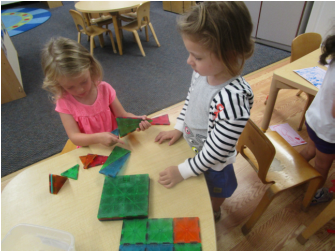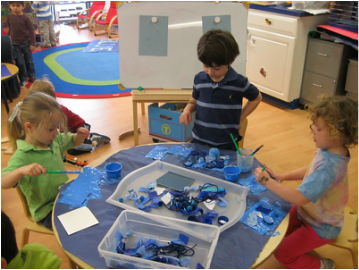Who We Are
A Child's Place is an early childhood center where children are seekers, teachers are guides, parents are partners, and administrators are leaders. It is a caring place where children are valued for their wonder, curiosity, and generosity of spirit. It is a setting that celebrates each child's love of home and community and where children discover and learn through play. It is a place where families are valued for their love, traditions, and dreams and where commitment to work, home and the community are respected. It is an environment where teachers are valued for their vision, skills, heart and knowledge, as well as their commitment to work, families, and community. It is a place where we truly treasure and share with each other.
A Child's Place is an early childhood center where children are seekers, teachers are guides, parents are partners, and administrators are leaders. It is a caring place where children are valued for their wonder, curiosity, and generosity of spirit. It is a setting that celebrates each child's love of home and community and where children discover and learn through play. It is a place where families are valued for their love, traditions, and dreams and where commitment to work, home and the community are respected. It is an environment where teachers are valued for their vision, skills, heart and knowledge, as well as their commitment to work, families, and community. It is a place where we truly treasure and share with each other.

Our Thoughts About Play
Play is the work of childhood. Young children learn best, not through direct instruction, but by doing and discovering. Play is the venue by which children discover the world around them, learn to relate to others, and release their stress and tensions. Teachers serve as facilitators and models of learning in an architectural setting that is arranged into developmental play centers, where children feel safe and emotionally at home.
Our curriculum is guided by the state of Connecticut Department of Education CTELDS (Connecticut Early Learning and Development Standards).
Play is the work of childhood. Young children learn best, not through direct instruction, but by doing and discovering. Play is the venue by which children discover the world around them, learn to relate to others, and release their stress and tensions. Teachers serve as facilitators and models of learning in an architectural setting that is arranged into developmental play centers, where children feel safe and emotionally at home.
Our curriculum is guided by the state of Connecticut Department of Education CTELDS (Connecticut Early Learning and Development Standards).

History of Our Programs
A Child's Place was created to respond to a need in the Westport community for full-time childcare and educational programs for families with young children. The Toddler/Threes programs opened in the then newly formed Parent Child Center in September 1980. In September 1983, our 10-month preschool program for 3-5 year olds was added to continue the children’s educational experience. In November of that year, the First Steps Daycare program, designed to provide year-round care for infants, was opened and has since been expanded to meet the full-time daycare needs of children 6 weeks through 5 years of age. In June 1990, the Early Childhood Education and Care component of SCC achieved accreditation from the National Association for the Education of Young Children. In September 1990, this component was given the name A Child’s Place. Our programs admit all children regardless of race, religion, nationality, or creed who may benefit from participation.
A Child's Place was created to respond to a need in the Westport community for full-time childcare and educational programs for families with young children. The Toddler/Threes programs opened in the then newly formed Parent Child Center in September 1980. In September 1983, our 10-month preschool program for 3-5 year olds was added to continue the children’s educational experience. In November of that year, the First Steps Daycare program, designed to provide year-round care for infants, was opened and has since been expanded to meet the full-time daycare needs of children 6 weeks through 5 years of age. In June 1990, the Early Childhood Education and Care component of SCC achieved accreditation from the National Association for the Education of Young Children. In September 1990, this component was given the name A Child’s Place. Our programs admit all children regardless of race, religion, nationality, or creed who may benefit from participation.
Family Involvement
The relationship between families and teachers is a vital part of children’s happiness and ease of transition between home and center. Please talk openly with your child’s teacher about any concerns, questions, or observations. Our staff strives to communicate with you about every aspect of your child’s day, whether it is lunch or a bump or a wobbly step. The same communication from you will provide the information we need to provide the best for your child.
The relationship between families and teachers is a vital part of children’s happiness and ease of transition between home and center. Please talk openly with your child’s teacher about any concerns, questions, or observations. Our staff strives to communicate with you about every aspect of your child’s day, whether it is lunch or a bump or a wobbly step. The same communication from you will provide the information we need to provide the best for your child.
- ACP will make every effort to provide the information contained in this handbook to each family in a language that they understand if needed.
- We have an open door policy and welcome families to participate in our Center.
- Family/teacher conferences for children will be held twice a year or more frequently at the discretion of the teacher or family.
- Please be mindful of situations that encourage successful communications; avoid trying to engage your child’s teacher during drop-off or pick-up. Voice mail is available for all staff and times that are conducive to constructive, informative dialogue will be arranged.
- Developmental milestones are recorded and kept on file by the classroom teacher to assist them in the proper planning for each child’s developmental needs.
- A Child’s Place maintains a cooperative relationship with the surrounding school systems. This enables us to make referrals to special programs and to have developmental assessments made available to the families of preschoolers.
- Referrals will be discussed with families and can only be made with parental consent.
- If a child is diagnosed with special needs, we need to be notified and invited to participate in all IEP and PPT meetings. We reserve the right to call a case review if deemed necessary. The IEP must be agreed upon and signed by both staff and family in order for the child to remain in the program.
- A family enrolling a child for the first time is welcome to spend extra time with their child to make adjustment comfortable.
- In addition to memoranda sent to families dealing with specific issues, weekly emails to keep families in touch with any activities and projects children are participating in. We welcome any and all family involvement in the program and always encourage families to share any ideas or concerns they may have.
- A yearly Parent Orientation is held for all age groups.
- We welcome participation from our families in many special events held throughout the year. These include, Holiday Party, Children’s Concert, our annual fundraising event, and end of the year family event. Special event titles may change from year to year and family will be given plenty of notice for upcoming special events.
- Families are encouraged to volunteer their time through storytelling, cultural exchanges, sharing a special talent, fundraising, work parties, etc. Becoming a Room Parent in your child’s class is one way to become a more integral part of your child’s experience at A Child’s Place. Room parents will work with the Board of Directors’ Parent Liaison Committee to plan social and special events for the children or families, parent meetings, and welcome new families to our program.
- Mothers are welcome to come breastfeed their babies. In the event that they cannot personally come we accept, store and serve human breast milk for feedings.
